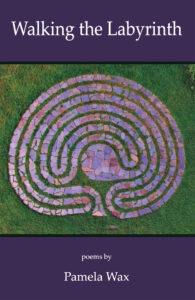 Poet Pamela Wax joins me today to chat about her newest collection, Walking the Labyrinth.
Poet Pamela Wax joins me today to chat about her newest collection, Walking the Labyrinth.
Bio:
Pamela Wax is the author of Walking the Labyrinth (Main Street Rag, 2022), a book of poetry written in the aftermath of her brother’s death by suicide, and the forthcoming chapbook, Starter Mothers (Finishing Line Press).
Her poems have received awards from Crosswinds Poetry Journal, Paterson Literary Review, Oberon Poetry Magazine and the Robinson Jeffers Tor House and have been published in many other journals.
Her writings on Jewish spirituality and women’s issues have also been widely published.
Pam is a rabbi who facilitates workshops including spiritual poetry writing, Mussar (a spiritual practice of character development), and Wise Aging. She walks labyrinths in the Northern Berkshires of Massachusetts.
What do you enjoy most about writing poems?
My initial impulse was cathartic; there was a compulsion, almost physical, to put my grief and pain on the page after my brother’s death by suicide. What engages me most now, however, is the intellectual challenge—it is more about my mind at work than being led solely by my heart. As a rabbi, I am deeply engaged in mining sacred text for meaning. I find that writing poetry provides the same intellectual thrill —uncovering new, layered meanings in text, probing a word or a phrase, playing with language. The puzzle of the “best words in the best order” —the definition that Coleridge gave for poetry—intrigues and engages me.
Can you give us a little insight into a few of your poems – perhaps a couple of your favorites?
My poem “Howard,” the first poem in the book, is a good example of what I’m referring to about word play. I took my brother’s name and excavated the syllables “How” and “-ward” for meaning.
We know that classical art training included copying the masters, and my classes through The Writers’ Studio trained me in the same way. My poem “Upon reading that Superhero Rocket Raccoon was inspired by the Beatles song, I think,” for instance, was inspired by a John Murillo poem (with an equally long title about Eric Dolphy) that I had such a good time writing, really following his poem closely as a model.
I am also partial to the abecedarian I wrote called “Approaching Zeal: A Run-On Abecedarian,” which was so much fun to write despite its mournful mood. I think my ability to write grief poems with a tone that can be playful is one of the strengths of many of my poems in the book.
What form are you inspired to write in the most? Why?
I mostly write free-form poems, though I have found that surprising things happen for me within the constraints of form — whether sonnets, sestinas, or that abecedarian I mentioned. I’ve also found that while I don’t typically write “funny,” the ode or a poem of address allows me to do that more easily. Though they are not in this collection, just thinking of the odes I’ve composed brings a smile to my face!
 What type of project are you working on next?
What type of project are you working on next?
My chapbook collection Starter Mothers will be out in August 2023 (Finishing Line Press) with a number of feminist poems, poems addressing my not being a mother, and a few more poems about grief and mortality. As I look ahead to my next full-length collection, it will involve my recurring themes of mortality and morality, in addition to several environmental and climate change poems—which are, indeed, also about morality and mortality. Since my rabbi self is so integrated into who I am, my poems are often laced with references to Jewish themes, as well. My engagement politically with the world also has led me to write poems in response to topical news — whether gun violence, climate change, or reproductive choice.
Last month I engaged with the Tupelo Press 30/30 challenge, writing 30 poems in July, and it was anyone’s guess where that writing would lead, but it was fun to find out!
When did you first consider yourself a writer / poet?
When I was in my early 20’s, I submitted poetry to a contest at the local community college in California and won enough money to attend the Napa Valley Writer’s Conference where I studied with Carolyn Forche. She was very encouraging of my writing. I also got to read shortly thereafter with Adrienne Rich and Ellen Bass at a fundraiser for our progressive Jewish community in Santa Cruz, CA. But the idea of “being a poet” terrified me, and I stopped writing poetry for close to 30 years. Though I continued writing—mostly memoir and some fiction—anything that was actually published was connected to my professional life as a rabbi, either academic or journalistic. I came back to poetry full-throttle after my brother’s death in 2018.
I’ve been doing a lot of thinking and reading as to “why poetry” when it comes to grief. For millennia, poetry has provided solace and comfort in times of extremis. Even my local librarian has mentioned how the poetry books went flying off the shelves during the pandemic. In that regard, my book is part of a long tradition.
How do you research markets for your work, perhaps as some advice for not-yet-published poets?
I scour lists from Poets and Writers and elsewhere (Driftwood Press has taken over Entropy’s monthly listings, Angela Carr sends out a monthly email with open submission information, and Erika Dreifus also regularly lists publishing opportunities in her blog). I keep a running tab of deadlines for different journals that I think might be a good fit. It is a time-consuming, laborious, and often fruitless task to research each journal and to send work out to their specifications. Not everyone has the stomach for it, but I like the challenge and spend a lot of time submitting my poems. I’ve developed a thicker skin for the many rejections, and rejoice in the rarer acceptances. As for the acceptances for the collections, it was definitely beginners’ luck that both Walking the Labyrinth and Starter Mothers were accepted on my first round of sending each of them out. I know that this is an atypical experience.
What would you say is your interesting writing quirk?
I keep a running list in Notes on my I-phone for when I get ideas for a poem or find interesting words I like the sound or meaning of. When I get stuck for ideas, I re-visit those notes. Jotting it down is an important first step of the percolation process. You wouldn’t be surprised to see me stop in the middle of a walk—or even in the middle of a conversation—to jot something down in my phone. If a title comes to me whole that I think I might want to build a poem around, I create a file in my computer to go back to someday. Just seeing the title there sometimes spurs me to action.
As a child, what did you want to be when you grew up?
I loved collecting coins and stamps from around the world and getting mail from my pen pals in Kenya and Israel. I remember going to the post office to inquire about working there and how the postal worker encouraged me to set my sights higher. At the time, I didn’t know what could be more fulfilling! I also remember being enamored by the United Nations and thinking about learning lots of languages and becoming an interpreter, being able to communicate with people from all over the world. But I suppose that both of those initial dream jobs got fulfilled by my love of writing and my intense attention to words—sending missives out into the world and speaking the language of poetry. I attended Oberlin College which fanned my feminist and progressive political fires. I capture that fiery spirit in a number of my poems, such as “Elegy for the Lady on Liberty Island,” https://www.passengersjournal.com/volume-3-issue-1-poetry/#wax, which is ever so relevant today following the fall of Roe v. Wade and which will appear in Starter Mothers.
Anything additional you want to share with the readers?
Poetry is a craft. I am fortunate to work privately with an editor with whom I review my poems closely for form, language, content, music, line breaks, and meaning. What I initially put down on the page may be cathartic, but it’s not always art. Having someone to offer constructive feedback — and then for me to be humble enough to accept it — is an important piece of the writing process. Growing thick skin has been an important part of my growing as a writer.
Links:
Main Street Rag publisher | Website (coming soon)
Thanks for being here today!
